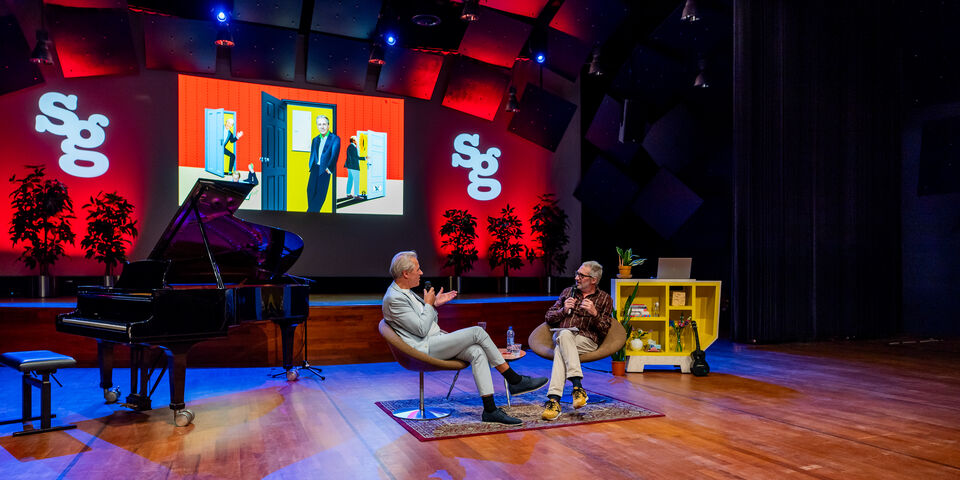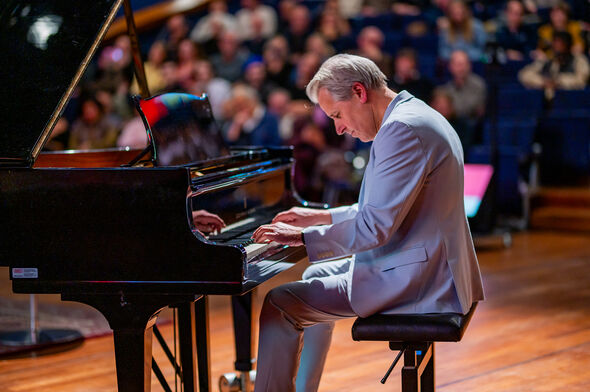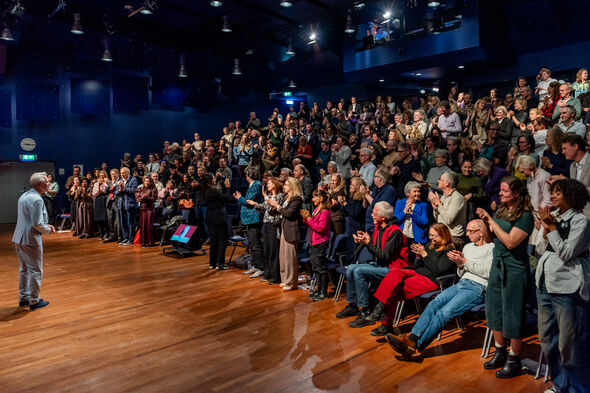Farewell to Lucas Asselbergs: “I’m a Studium Generalist”
Lucas Asselbergs said his goodbyes to TU/e and to Studium Generale, the office he led for sixteen years, on Wednesday evening. In the Blauwe Zaal, interviewer Frénk van der Linden questioned him—between musical surprises—about his labradoodle mentality, the loss of Gaslab, his drive to help people find their strengths, and his love for Jeanette.
When the members of the Studium Generale team say farewell to “their” Lucas Asselbergs, of course they do so with a meticulously prepared stage night. And so it went on Wednesday evening in a packed Blauwe Zaal. A home game for Asselbergs, who is retiring after 35 years at TU/e, the last 16 of which he spent as head of Studium Generale.
The common thread of the farewell program—titled the Evening of Asselbergs—is the set of questions posed by master interviewer Frénk van der Linden. Cheerful and skillful musical interludes are provided by student music association Quadrivium: one moment a marching band suddenly crosses the stage, the next a cappella singing has the audience holding its breath. But the biggest musical surprise comes from Asselbergs himself, who improvises the evening’s closing chord on the grand piano.
Pleaser
Music is a major part of Asselbergs’ identity. He arranges, and the piano is his great love, but he plays many other instruments as well. Even so, an academic career initially seemed in the cards: he studied psychology in Utrecht and earned his PhD at what is now the Trimbos Institute, supervised by former D66 senator Paul Schnabel.
But after receiving his doctorate, he decided for the first time in his life to buck expectations: “I chose music, and of course that disappointed my parents.” His natural inclination is to please. “I’m a bit of a labradoodle.” It’s a mindset he has since learned to embrace and channel: “If needed, I can be tough too.”
Dummies
Another defining trait of Asselbergs is that he has always pursued his interests and skills broadly. That attitude brought him a rich life, though it may have kept him from reaching the very top in a single field. “I’m a Studium Generalist,” he responds wittily when Van der Linden presses him on this.
In the 1990s, he combined his work at TU/e with a grueling schedule of about a hundred musical performances a year. And anyone who has seen his living room—also his music room—knows it holds a long list of instruments: from piano to drums, and from accordion to ukulele. Asselbergs plays them all.
Student psychologist
Although his musical career never produced a number one hit, it was certainly successful. With the Boulevard of Broken Dreams orchestra, he won an Edison Award. And with the jazz band the Handsome Harry Company, he toured Europe for seventeen years and recorded seven CDs. When he joined Studium Generale in 1991, it was as a music programmer.
That’s where he met Jeanette Schoumacher, who became more than a colleague. In 1998 he temporarily left Studium Generale to work as a student psychologist and trainer at STU, the predecessor of ESA. He then moved into a policy officer position at the Department of Industrial Design.
Towels
Until last year, when Schoumacher retired, the couple always worked together. Even when Asselbergs returned to Studium Generale in 2009, this time as head. Their joint projects included anniversary celebrations and the TU/e exhibitions during Dutch Design Week.
The two make and excellent team, Asselbergs says, casting a glance at Schoumacher, who is seated in the front row with their daughters and grandchildren. “Whether we’re cooking together, working in the garden, or—just to name something—loading washing machine after washing machine with black towels.”
This last example occurred during TU/e’s 2021 anniversary, when management for headliner Typhoon informed them that the dressing room needed to be stocked with large piles of “new, but washed” black towels.
Week of Asselbergs
The Evening of Asselbergs is the culmination of a farewell week filled with cultural programs, each highlighting a different aspect of Lucas Asselbergs. Monday’s surprise film turned out to be Blonde Dolly, a 1987 movie about the murder of a sex worker. Its IMDB rating is somewhat lower than the average film screened by Studium Generale in the Zwarte Doos, but it has one major advantage: Asselbergs’ name appears in the credits under “film music.”
“I was asked because the sound of the orchestra I arranged for, fit the film, which is set in the 1950s. It was wonderful to see it again, though I’m a bit anxious about the audience’s evaluation.”
On Tuesday, accordionist Vincent van Amsterdam performed classical repertoire on the instrument. “This fits Studium Generale perfectly: exposing you to unexpected moments of beauty. The accordion with that folksy image, producing such stunning classical music.”
Wednesday’s program focused on Asselbergs’ roots in psychology, with a lecture about treatment options for psychopathy.
The Thursday finale was a personal talk by comedian Erik van Muiswinkel, reflecting on his career. His connection to Asselbergs is unexpected: Van Muiswinkel is a childhood friend. “When we were about twelve, we performed cabaret shows together at the cricket club in Haarlem, where we were both members.”
Hide-and-seek
With interviewer Van der Linden, Asselbergs looks back on the programs that stood out most to him. Like the time a man with pedophilic feelings came to speak about his experiences. “He didn’t act on those feelings, but of course it was extremely complex and sensitive. Even though I had communicated carefully in advance about the reasoning behind this choice, the Executive Board later made it clear that more coordination would have been appreciated.”
More recent was the evening when artist in residence Stefano Keizers played hide-and-seek with crowds of students in the Auditorium. “Very unexpected and out of the box.” And Keizers hasn’t forgotten Asselbergs either: he appears in the Blauwe Zaal with a video message, sending his best wishes.
Gaslab
Then there are the painful memories. Asselbergs pauses at the deep sorrow the team felt when their colleague Corine Bolwerk—an invaluable presence at Studium Generale for decades—became ill and passed away in 2022.
And what does he, looking back, regret most? “Giving up Gaslab.” Before moving to Luna and the Blauwe Zaal, this small building behind Vertigo housed Studium Generale’s stage. “TU/e was dealing with a shortage of space, and I did understand that.”
But still. “In hindsight, I should have chained myself to Gaslab and let them drag me out screaming and spitting,” he says half joking, half serious. Opposite that loss stands a victory: “Keeping our share in the USE/ITEC program for academic development.”
Warmth
What, in conclusion, did Asselbergs love most about his job? Something his parents demonstrated to him: “They gave me freedom, weren’t constantly on my case, but encouraged me in everything I pursued. As a manager I tried to do the same: helping people find their strengths. Seeing where they want to grow, what makes them happiest, and supporting them—whether within or outside Studium Generale.”
His greatest accomplishment follows from that philosophy: forging “his” group of people into a close-knit team, one that complements and inspires one another. He concludes, “Beautiful things come from warmth.” Like this Evening of Asselbergs.
Ichi-go ichi-e
The day after, Lucas Asselbergs clears out his office in the Auditorium with the help of Schoumacher, making space for his successor, Olga Coolen. How does he look back on his farewell evening?
“Do you know the concept ichi-go ichi-e? It’s a Japanese version of carpe diem, seize the day, but much more philosophical: it refers to the moment that exists now and will never return.” When that thought lands, he becomes emotional for a moment.
Then: “It stands in stark contrast to our fleeting culture, where all the tapping and swiping has given us the attention span of a goldfish. That wasn’t the case yesterday in the Blauwe Zaal: everyone was fully present. In a way, ichi-go ichi-e is what Studium Generale strives for as well: creating unique, meaningful moments.”





Discussion